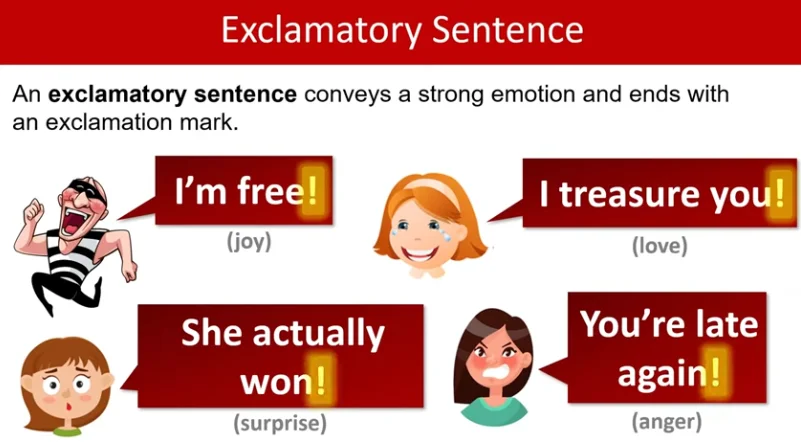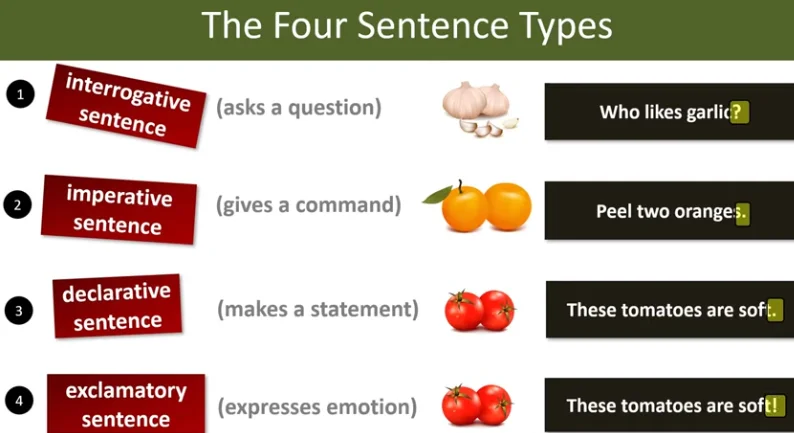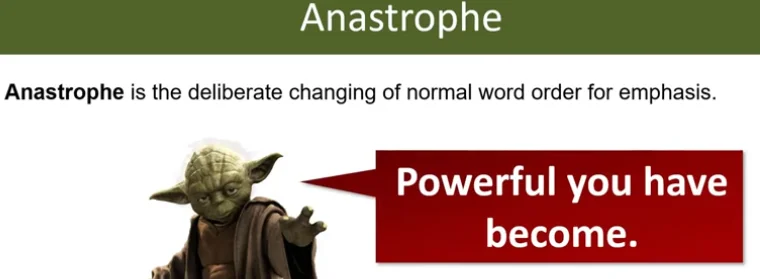An exclamatory sentence is one of the four kinds of sentences that convey effectively strong emotion and ends with an exclamation mark. (!)
Examples of Exclamatory Sentence
- I’m free! (Emotion of joy)
- I treasure you! (Emotion of love)
- She won! (Expressing surprise)
- You’re late again! (Emotion of anger)
- Wow! these tomatoes are soft!
- Yes. these tomatoes are so soft!
- Yay! these are such soft tomatoes!
- Oh, what mushy tomatoes these are!
- Yuck! how mushy these tomatoes are!
It is common to see an exclamatory sentence preceded with the type of word called an interjection. And, this is a great way of making it clear what the emotion is you’re trying to portray.
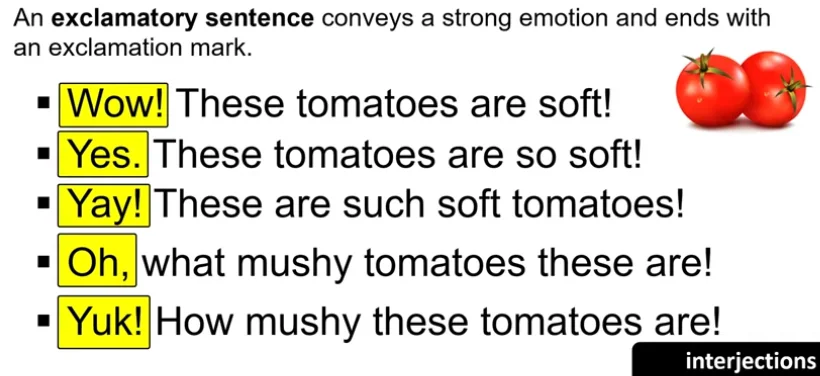
Use of Interjectons in Exclamatory Sentences
The words at the front of the sentence highlighted are called interjections. And, an interjection can be used to support an exclamatory sentence. But there are three ways to punctuate an interjection. So, you can use an exclamation mark like the top one that makes the interjection powerful. Besides, you can use a full stop like the second one and that makes the interjection milder and creates a slight pause. Or, you can use a comma like the fourth one and this is also a mild interjection and creates less of a pause. But the two most common ways are exclamation marks and commas. An exclamation mark is a strong interjection of a full stop. And, commas are used for milder interjections.
Notice that all of these sentences end with exclamation marks. That is a good telltale sign for an exclamatory sentence.
Note: Not every sentence that ends in an exclamation mark is exclamatory. Sometimes, an imperative sentence can also end in exclamation marks and that just makes the command more forceful.
Let’s put our example back up about tomatoes.
- These tomatoes are soft.
- These tomatoes are soft!
The first sentence ends with a full stop but the second with an exclamation mark. Now, the top one is a declarative sentence, it just states a fact. The bottom one is an exclamatory sentence; it expresses the emotion.
Here are some other techniques to express emotions with emphasis. For example:
- These tomatoes are so soft!
- You’re so cute! my baby.
- The horse is so faithful!
- The car is running so fast!
- The colors of rainbow are so beautiful!
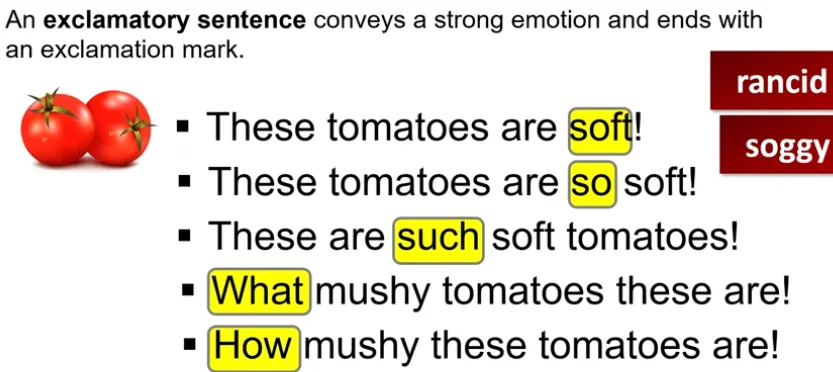
Putting the word= “so” in front of an adjective is a good technique for creating a better exclamatory sentence.
These are such soft tomatoes. Using the word= “such” is another technique for creating a better exclamatory sentence.
Besides, we can say with more emphasis like:
- The tomatoes are such rancid!
- Her way of looking at me is such disgusting!
- This is such a perfectly easy method!
- Such a delightful party it is, Aha!
- The grapes are such soggy, Oh!
So, the emotion in an exclamatory sentence is not just conveyed by the exclamation mark it’s also conveyed by the word choice. And, when you found a good word, you can emphasize it with words like so and such.
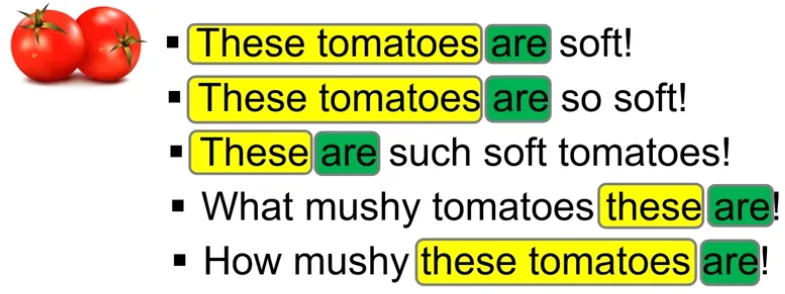
Starting your exclamatory sentence with what is another technique to build an exclamatory sentence is here.
- What mushy tomatoes these are! Or
- How mushy these tomatoes are!
Four Sentence Types
So, these are all exclamatory sentences but actually, that is just one type of sentence. There are four types of sentences. So, we can compare them with exclamatory sentences.
- Interrogative sentence asks a question, for example: Who likes garlic?
- Imperative sentence which gives a command, for example: Peel two oranges.
- Declarative sentence which makes a statement, for example: These tomatoes are soft.
- Exclamatory sentence and that expresses emotion, for example: These tomatoes are soft!
Now, you will have noticed that the last two are the same apart from the end punctuation. For now, just have a look at how each of these sentence types ends.
- So, an interrogative sentence ends with a question mark.
- An imperative sentence ends with a full stop or a period.
- The declarative sentences end with a period.
- And, an exclamatory sentence ends with an exclamation mark.
Examples of Interrogative sentences
- Is garlic smelly?
- Do you live in Lahore?
- Are you an active student?
- Are you ready to participate in the class?
- Where is your address card?
Examples of Imperative Sentences
- Prepare the garlic!
- Don’t jump over this wall!
- Write your proposal first.
- Please! Make breakfast for us.
- Avoid smoking 🚬 here.
Examples of Exclamatory Sentences
- I hate these greedy people!
- Yes! This is the loveliest scene.
- Such an irritating noise of the drum!
- Oh! It’s a wonderful story.
- Garlic is disgusting!
In an exclamatory sentence, you don’t have a subject. Rather, it’s just the verb the subject is implied actually. It’s the word you implied but it doesn’t feature in the sentence it’s just the verb. Overall, An exclamatory sentence has the same format as a declarative sentence. Only, it will end in an exclamation mark and it will feature more emotive words. The format of an exclamatory sentence is subject and verb like it is in a declarative sentence.
But, the function of Anastrophe is that it deliberately changes the normal word order of a sentence to lay more emphasis on it. For example:
- Powerful you have become.
- Peacefully you have slept.
- Lazy are the most of the employees.
Mistakes in the Use of Exclamatory Sentence
First, do not overuse exclamatory sentences. This kind of sentence portrays a strong ray of emotion. Unluckily, if you add emotion to everything, you add emotion to nothing. In other words, use exclamatory sentences sparingly to maintain their impact.
And the second point is; don’t use more than one exclamation mark. But this idea is well captured in a quotation by the author Terry Pratchett.
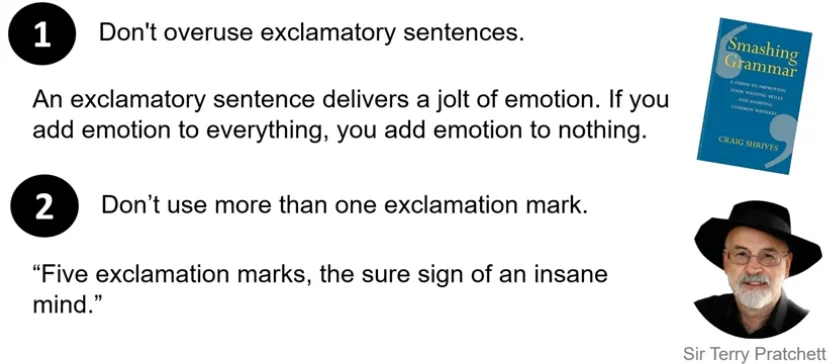
Recap of exclamatory sentence
It conveys strong emotion and ends with an exclamation mark. For example, instead of soft you might use rancid or soggy or something else. That makes it clear what the emotion is you’re trying to convey. Don’t forget you can use the word “so” and “such” to improve your exclamatory sentence. In addition, you can use a sentence that starts with “what” and employ some anastrophe or a sentence that starts with “how” and employs anastrophe. In an exclamatory sentence, the order will be subject, verb as it is in all of these examples. But, try to bring your exclamatory sentence to the life you can precede it with an interjection.
